Why Bring Kids and Teens to the Farmers Market? An Educator’s Perspective
August 14, 2025
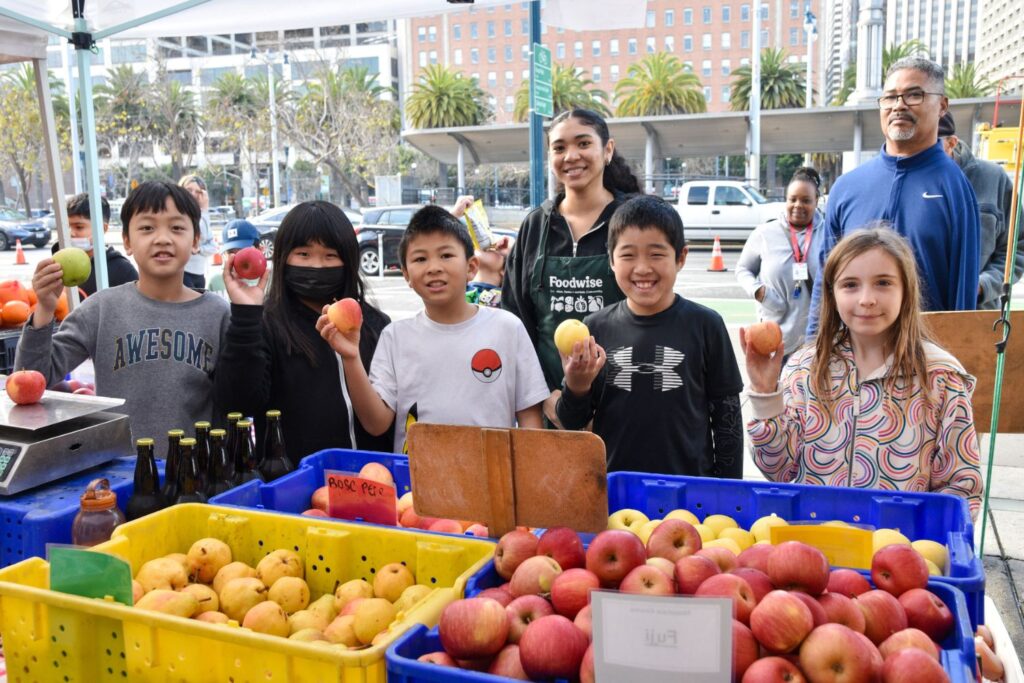
Since 2011, Foodwise has delivered free education for San Francisco kids, including farmers market field trips for elementary school students and cooking, gardening, and job skills programming for teens. Why does Foodwise prioritize youth as important members of our farmers market community?
We spoke with Erica Tate, who has supported our Foodwise Kids and Foodwise Teens programs since August 2023, most recently as an Education Coordinator, a position funded through the Sustainability Service Corps. Foodwise depends on passionate team members like Erica, along with interns and volunteers, to deliver free food education to thousands of SFUSD students. When federal cuts were made to AmeriCorps last spring, the funding for her position was eliminated, but with your support, Foodwise was able to bring Erica on as a paid staff member to help keep our education programs going.
Erica shared some of the transformations she’s witnessed working with kids and teens at the farmers market, the importance of food and sustainability education, and the hope and wisdom that young people have to teach us in creating a better food future
Where does your interest in food come from?
Nutrition and food as a form of medicine have always fascinated me, even from a young age. My earliest memories of cooking come from spending time in the kitchen with my grandmother, Elena, learning how to make traditional Mexican dishes. She didn’t just teach me how to cook; she showed me how food could bring people together, nourish the body, and express culture. As I got older, I started to understand the deeper impact food has on our health and well-being, and became curious about how it could be used to heal and support the body holistically.
That curiosity evolved into a passion, and that’s what led me to Foodwise. I love that Foodwise doesn’t just teach people about food, but it connects nutrition, sustainability, seasonal eating, and food justice, while also addressing bigger issues like climate change. It’s a space where I can share knowledge and inspire others to view food as more than just something we eat.
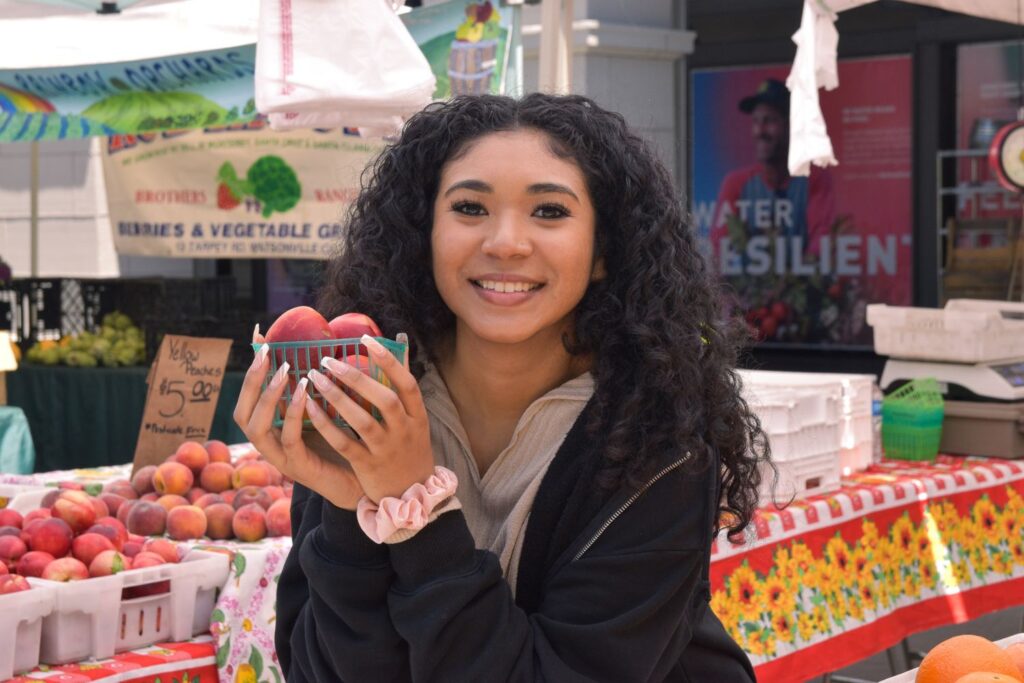
How did you get involved with Foodwise?
I first got involved with Foodwise in 2023, during my last year of undergrad through College Corps, an AmeriCorps program that connects college students with nonprofits for a year of service. I served as a Foodwise Teens Intern, supporting the youth program through in-classroom sessions, culinary lessons, and garden-based learning.
After graduating, I learned about the opportunity to return as an Education Coordinator through another AmeriCorps program, the Sustainability Service Corps, which aligned perfectly with Foodwise’s education goals. Through this role, I’ve been able to deepen my involvement in both the Foodwise Kids and Teens programs, contribute to lesson planning, support students in hands-on learning, and expand my own skills in youth education and sustainability-focused programming.
How was your Sustainability Service Corps fellowship impacted by federal funding cuts?
Unfortunately, halfway through my service term, the Department of Government Efficiency made major cuts to AmeriCorps programs nationwide, eliminating about two-thirds of placements, including mine. It was incredibly disappointing and disheartening to have my fellowship end so abruptly, especially because I felt deeply connected to the work and the youth I was serving.
Thankfully, Foodwise recognized the importance of the role and the continuity of the work I was doing. They moved quickly to ensure I could stay on as a part-time staff member through what would’ve been the end of my AmeriCorps service term. Their support meant everything and reaffirmed how committed they are to both their team and the youth we serve.
How would you describe what you do in the Foodwise Kids and Foodwise Teens programs? What does a typical day look like?
A typical day starts around 9 a.m, when I set up the kitchen and classroom space for Foodwise Kids at the Ferry Plaza Farmers Market. Once the students arrive, we run a two-hour hands-on program focused on the farmer’s market, produce exploration, seasonality, and nutrition. Afterward, I help with breakdown and cleanup before heading upstairs to tackle administrative tasks or meetings.
Later in the afternoon, I travel to one of our partner high schools to run the Foodwise Teens program. We prep materials for the day’s classroom, culinary, or garden activities, then run a two-hour session with the teens. We usually wrap up around 6 p.m. On non-programming days, I focus on scheduling teachers, developing lesson plans, and organizing future sessions.
Both the kids and teens programs aim to empower youth with food knowledge, culinary confidence, and a deeper understanding of sustainability and local food systems.
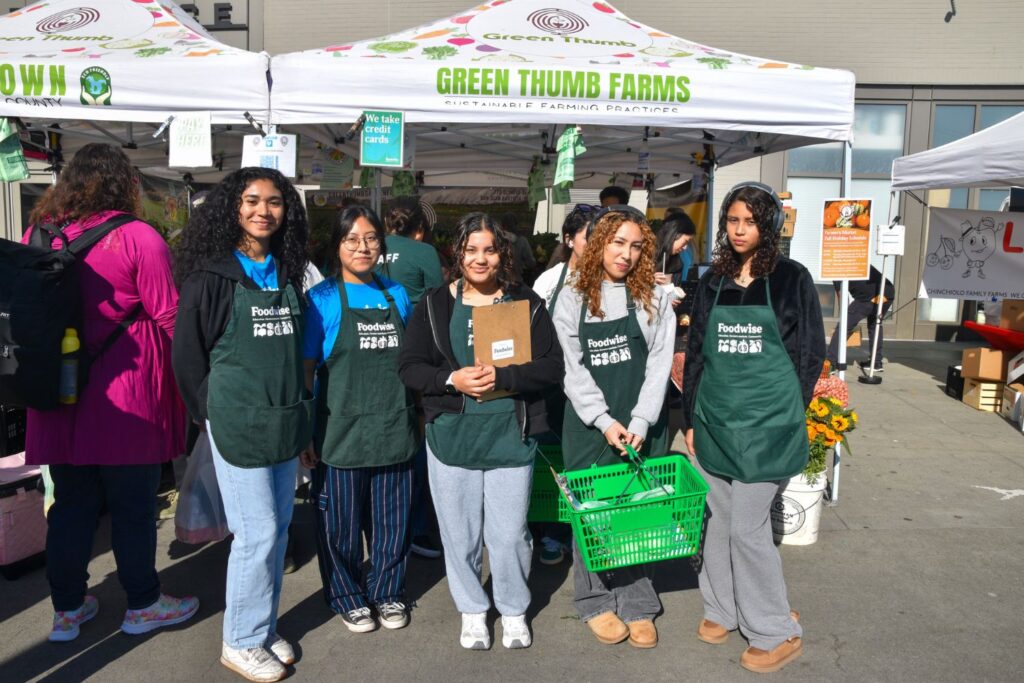
What are some of the challenges and rewards of working with youth at the farmers market?
One challenge is designing menu items for Saturday market days. The recipes need to highlight seasonal ingredients from the market and reflect what’s available, while still being accessible to the teens’ skill levels, but also making it challenging enough to help them grow and not be overwhelmed. Another challenge is figuring out how to make food system concepts digestible and relatable in a way that inspires them to care not only for their own nutrition, but about the planet too. It takes creativity and patience to spark that interest.
But the rewards are incredible. I love seeing teens become passionate about the topics we cover and really step into their roles as environmental and food system stewards. It’s especially rewarding to watch their culinary skills develop or to see shy students open up and find their voice by the end of the semester. One of my favorite things is when students tell me they recreated a recipe at home, or when they start enjoying fruits and vegetables they initially didn’t like.
Do you approach working with kids and teens differently?
Honestly, not a whole lot; at least not for younger kids. A child’s relationship with food often depends heavily on the exposure they get at home. If parents or guardians are proactive about incorporating fruits and vegetables into meals, kids are more likely to have a positive relationship with them. But when that exposure is lacking, many kids come in with limited experience or aversion to certain foods. That’s why programs like Foodwise Kids are so important: we help bridge that gap and offer a fun, supportive space for trying new fruits and vegetables.
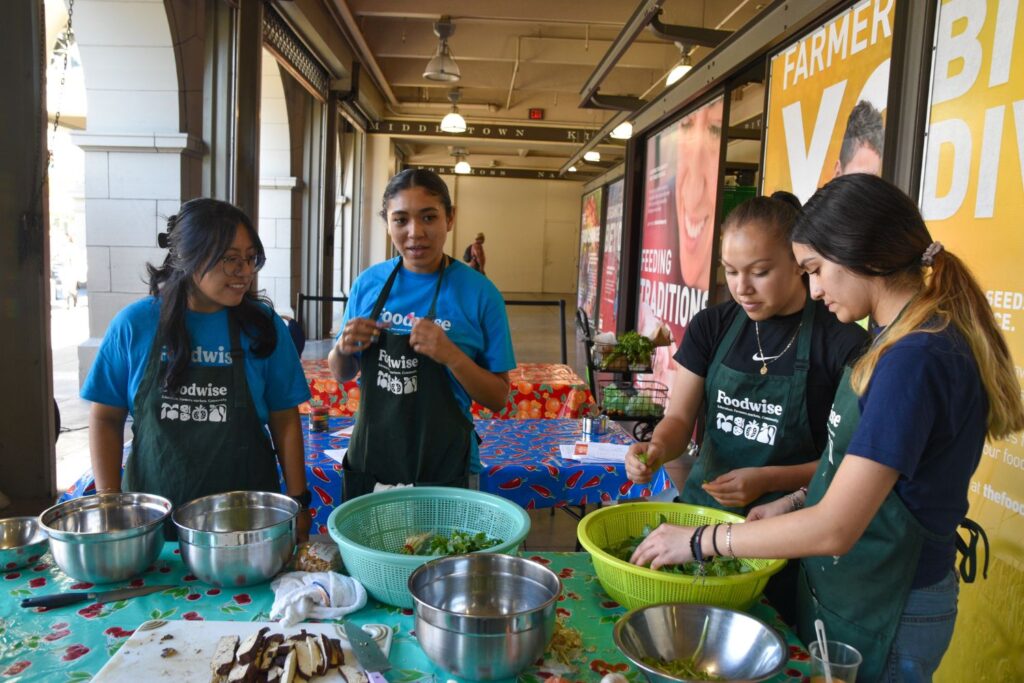
Can you recall any particular moments when you felt that you made an impact?
Yes, honestly it happens almost weekly with Foodwise Kids. We get kids who come in saying they don’t like vegetables, especially things like broccoli. But after exploring them in our program and trying them in a new way, many of them change their minds. Sometimes all it takes is a little encouragement and a fun experience to shift their mindset and open up their palates.
Do you have any advice for parents, guardians, or educators who hope to inspire young people to love fruits and vegetables?
Exposure is key! You can talk about the importance of fruits and vegetables all day, but if kids never get the chance to taste or cook with them, it’s hard to create that connection. How you expose them also matters. By simply seasoning, creating fun recipes, and having hands-on cooking experiences can make a huge difference. Letting kids be part of the process, whether it’s picking out the produce or helping prepare a dish, gives them ownership and builds a positive relationship with food, especially fruits and vegetables.
What is something you have learned from working with young people?
Working with youth is grounding. They have this natural curiosity and appreciation for small things that adults sometimes forget to notice. That energy is contagious; it reminds you to slow down, be present, and enjoy the moment. They also bring creative ideas and aren’t afraid to think outside the box, especially in the kitchen. Their fresh perspective can teach us a lot if we’re willing to listen.
What’s next for you? How will you take these experiences with you?
This fall, I’ll be starting my Master’s in Cell and Molecular Biology at San Francisco State University as an SEO Genentech Foundation Scholar. I’m excited to carry everything I’ve learned at Foodwise into the next chapter, especially the importance of community health, sustainable food systems, and youth education. I hope to continue sharing knowledge with my family, friends, and community to help promote healthier lifestyles and greater awareness around food and wellness.
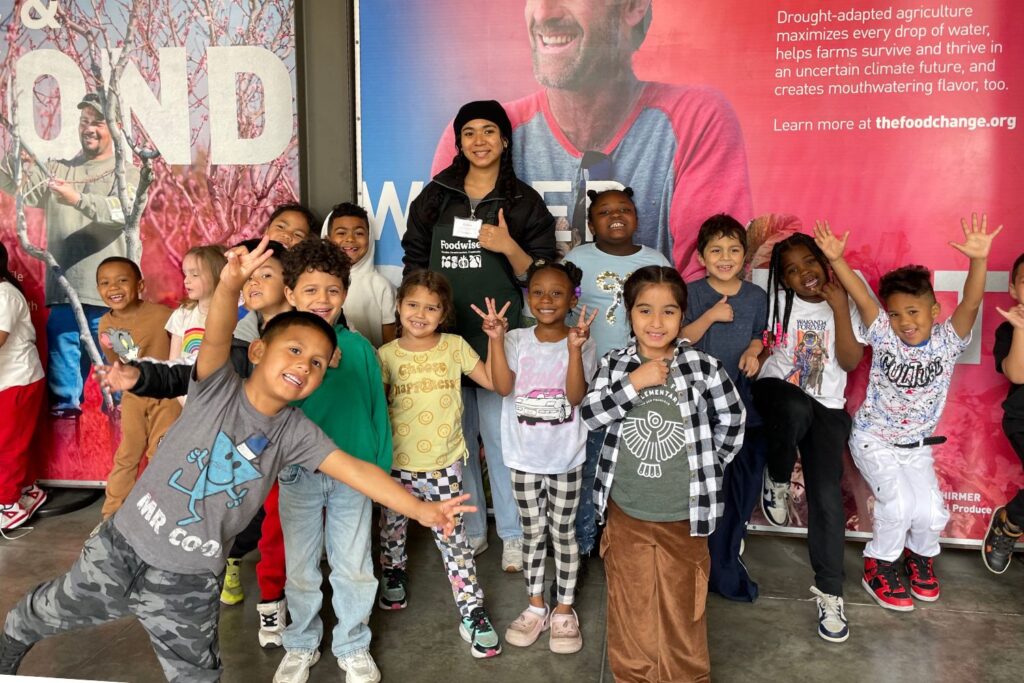
From your experience, why is it important for young people to have access to farmers markets and to programs like Foodwise Kids and Foodwise Teens?
These programs really do make a difference. With Foodwise Kids, I see firsthand how exposure changes attitudes. Kids walk in skeptical of vegetables and walk out curious and excited. With Foodwise Teens, we see deeper transformations over the semester. Teens gain confidence, improve communication skills, and feel more prepared to enter the workforce. Many have told me this program helped them get their first job or feel more comfortable in professional spaces. These are the kinds of outcomes that show how vital this work is.
Programs like Foodwise Kids and Teens are essential. They help shape the next generation of informed, confident, and compassionate leaders. If we want a future where communities are healthier, food systems are more sustainable, and people care about the planet, we need to invest in programs like this. They work and they matter.
Help Foodwise deliver free education programs to thousands SFUSD students. Donate to our Back to School, Back to the Farmers Market campaign to help us reach our goal of $35,000 by August 31.
Topics: Foodwise Kids, Foodwise Teens, Youth
